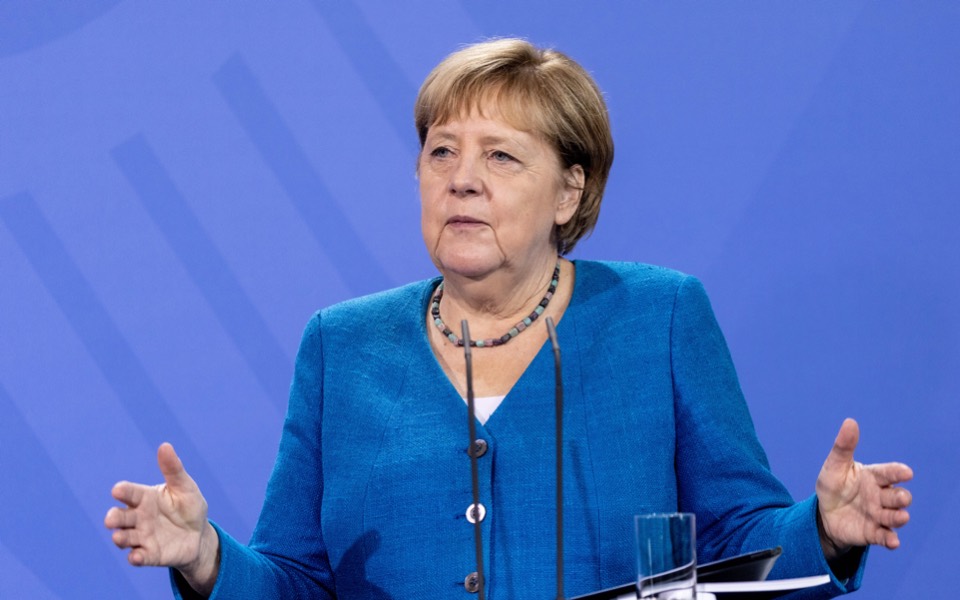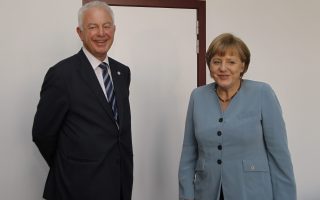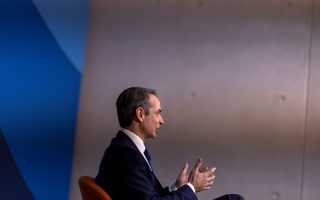Greece and migration: Events that defined Chancellor Merkel’s 16 years in office

In Germany there is currently a popular guessing game: What will Angela Merkel do after her chancellorship ends? Asked about her plans recently at a meeting in Duesseldorf, she answered in questions: “Would I like to write? Do I want to deliver speeches? Do I want to hike? Do I want to be at home? Would I like to travel?” She will deal with those questions after leaving office, Merkel said.
Should she decide to write memoirs, Greece will probably play a major role in them. Asked about the hardest moments of her years in office, she told the audience in Duesseldorf: “The hardest [moments] came during the euro crisis when, from the point of view of many, I was very tough as far as the demands from Greece were concerned, so that Greece could get help from us. Because I was deeply convinced that we cannot have a common currency unless we also have a common basic economic structure.”
In fact, the two foreign policy events that shaped Merkel’s years as German chancellor both had to do with Greece. During the euro crisis, Merkel showed her tough (some would say: her principled) side. In the beginning, Merkel did not even clearly rule out a Grexit. In May 2011 she claimed that in countries like Greece or Portugal people retired earlier than in Germany. At that time, she was criticized for those kinds of statements as populist not only by the German Social Democrats, but Angela Merkel did not seem to care. With the right-wing populist party Alternative for Germany (AfD) emerging, she made it clear that with her as German chancellor, solidarity in the eurozone would have a stiff price tag pinned onto it: “Yes, Germany helps, but Germany only helps if the others really make an effort, and that has to be proven.” Such sentences kept the AfD out of parliament and the CDU in power.
In 2015, however, during the migration crisis, Merkel could or would no longer show her tough side. One consequence of this was that the AfD, which by then had moved from right-wing populist to partially right-wing extremist, made it into the Bundestag in 2017. By that time, Merkel had also long changed her approach toward Greece. This had become more and more visible after the 2013 elections. It seems that Merkel became well aware of the potential political fallout of a Grexit. That is why in later years she tried to avoid such a scenario at almost any cost – an attitude that cannot be attributed to all members of her government at the time.
Merkel’s change of course was part of a learning curve. Germany is a rather self-fixated country. The German foreign policy debate is sometimes embarrassingly provincial and disconnected from reality. When Merkel became chancellor in 2006, she had no significant experience in foreign policy, just like her two predecessors Gerhard Schroeder and Helmut Kohl, when they came to office. Sixteen years on, Merkel speaks and acts in global terms.
It is noteworthy that Angela Merkel’s second major foreign policy U-turn has so far hardly been noticed. In 2015, Merkel did not want to build fences and walls, thus becoming a heroine of the “refugees-welcome” ideology. But Berlin today is different. It has dawned on many that a constant, major influx of refugees and migrants to Europe is not sustainable as long as even legally rejected asylum seekers regularly cannot be deported to their home countries, thus undermining the very idea of asylum for those who really need it. In any case, the systematic breach of international law at the European external borders (“pushbacks”), as we see it in Greece or Croatia, is tacitly tolerated by Berlin, in some cases even indirectly promoted. Nevertheless, Merkel is still seen as a kind of Saint Joan of refugees in left-wing circles. Somehow this narrative ignores her much tougher stand compared to 2015.
So, what is her legacy then? Nobel laureate for literature Guenter Grass once said that his favorite flower is the year-round blooming gray skepticism. Angela Merkel left us a whole bouquet of such flowers. Future generations will judge whether they smell of humanity, pragmatism or cynicism, or a little bit of everything.
Michael Martens is a German journalist and author.





